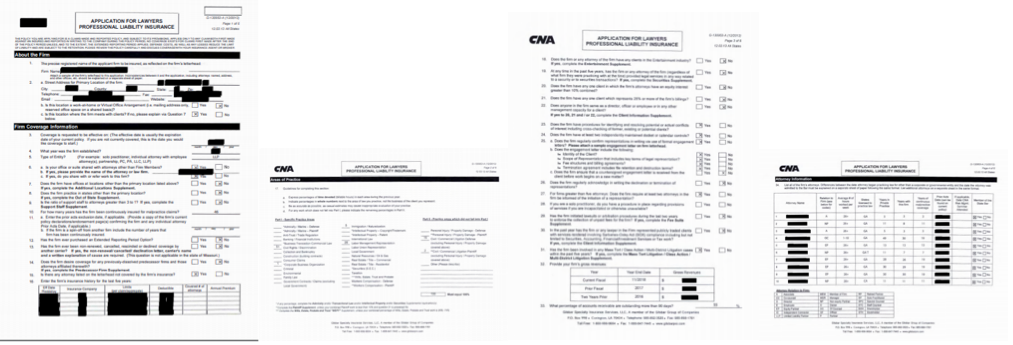Let’s be honest – insurance is one of those things no one likes thinking about. It’s also one of those things everyone knows they need. Law firms are no exception – the ABA estimates that 80% of lawyers will be sued for malpractice at some point in their careers, with the biggest targets being small firms and solo practitioners.
No firm wants to be caught without professional liability insurance when something goes wrong, but the process of obtaining it has always been time-consuming, antiquated, overly expensive, and just downright dreadful.
Until now. Insurtech company Embroker is radically changing the way companies, including law firms, find insurance. By replacing antiquated processes and high overhead costs with technology and algorithms, Embroker allows law firms to find the right coverage at a fraction of the hassle and cost they’re used to.
If you’re like most firms, you’ve incorporated plenty of legal tech into your practice because it saves time and money. Now it’s time to add some insurtech to your arsenal and break free from the dreaded insurance cycle.
The Old Way of Doing Things
If you’ve ever applied for insurance for your firm, you know how it goes: a broker sends you a PDF of the application that ranges anywhere from 9 to 40 pages long, you spend up to 10 hours answering questions and providing information that will never be used (or a lot more if you’re a large firm), you send the PDF back to the broker, the broker sends it to the underwriter, then you wait weeks until you eventually receive a quote. If you want to make any modifications, the cycle repeats, and you finally end up with coverage a month or more later.

While the ultimate cost of your insurance depends on factors like how many lawyers you have, where you practice, and the kinds of law you practice, only half of the money you’ve been spending on any insurance policy has been going toward actually paying claims.
That’s right – half. So, what’s the other half? Overhead and distribution costs – personnel and manual, antiquated processes like all that back-and-forth with the brokers and underwriters.
This other half is where Embroker comes in. By injecting technology, Embroker eliminates the processes that have long been overly expensive and allows you to pay just for the thing you really want – the insurance.
How Embroker Works
Remember that tedious, lengthy PDF application? Embroker has done away with that. Instead, Embroker’s landing page for legal customers takes you straight into the online application.

First, you provide your basic, high-level information, like your name, address, industry, revenue details, and contact information, and Embroker immediately analyzes and confirms your business profile to make sure you’re eligible as a law firm for professional liability insurance. Once you pass that initial step, you answer some simple questions about your law firm’s practice, including areas of law, how many attorneys you have, where they practice, the kind of cases the firm handles, the firm’s risk management processes, and past legal incidents. These questions aren’t designed to disqualify you from coverage, but rather to quantify your risk and determine your coverage qualifications. If you currently have insurance, Embroker will try to align any new policies with your current coverage.
The entire application process takes about 10 minutes – a fraction of the time even the simplest PDF application has historically taken. Your application then goes through an automated underwriting process and you get an actual premium quote in a matter of seconds. From there, you can tweak your requirements by increasing limits, decreasing deductibles, requesting loss-only deductibles, designating your claims expense treatment, adding claims and defense limits, and much more – adjustments you might not have even known were options for lowering your incremental costs and better protecting your firm and its finances.
The automated underwriting process again quickly generates your premium quote. You can print a PDF of the customized quote and your specimen policy if you need to obtain approval, or you can bind your policy then and there, digitally paying through the Embroker website. Your policy is immediately available and accessible at any time.
Better yet, this speedy process is even faster if you’re a returning customer. Your renewal application will have your basic information pre-filled for you, and the underwriting process takes as little as three to five minutes.
What’s glaringly missing from this process is all the back and forth you’re used to with traditional insurance applications, and that’s a great thing. Even with multiple rounds of tweaking coverage requirements, you can still obtain a quote in well under an hour and get coverage that’s binding today.
By now you might be asking yourself why you would ever apply for insurance the traditional way again. The answer? You wouldn’t, and you shouldn’t.
The End Result
Professional liability insurance is usually one of the first purchases law firms make, and one of their largest expenses. Having 50% of that expense go to overhead, distribution, and costs that have nothing to do with actual coverage just makes no sense. The cost of insurance that represents actual claims you face will always be a reality of practice, but Embroker’s technology and algorithms can dramatically reduce the other half.
You still get quality insurance from the same top, A+-rated carriers, and you often get better coverage because you can easily pick the policy terms you want. You just spend a lot less money to get it. If you’re a Clio user, you save even more – as the endorsed broker for Clio, Embroker offers Clio users a 10% discount.
In addition to professional liability coverage, Embroker offers digital products for law firms’ other property and casualty needs, handled the same way through Embroker’s fast, automated underwriting algorithms. With it all, you get technical support and helpful risk management resources.
When it comes to running a law firm, you want all your processes to be better, faster, and cheaper. For malpractice insurance, Embroker fits the bill. You get a more cost-effective product without sacrificing coverage.
No one earned a law degree to spend time getting bogged down in administrative tasks like applying for professional liability coverage. With Embroker on your side, insurance is one less hassle to worry about. With the time you save, you can focus on serving your clients and growing your firm.








 Kathryn Rubino is a Senior Editor at Above the Law, and host of
Kathryn Rubino is a Senior Editor at Above the Law, and host of 









